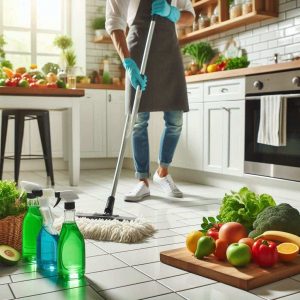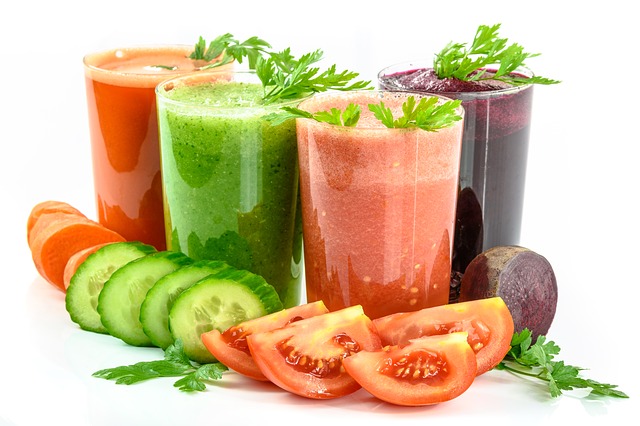How Tile Cleaners Keep Food & Drink Areas Hygienic
 Food and drink preparation often focus on ingredients, recipes, and flavors. Yet, the foundation of a healthy kitchen begins with cleanliness—especially the floors and tiles. Whether in a home kitchen, restaurant, or café, tiles collect grease, food crumbs, and spilled liquids daily. Over time, these contaminants can breed bacteria and make floors slippery or discolored. Regular mopping helps, but it’s the best tile cleaners that truly remove deep-seated dirt and keep the kitchen environment safe and hygienic.
Food and drink preparation often focus on ingredients, recipes, and flavors. Yet, the foundation of a healthy kitchen begins with cleanliness—especially the floors and tiles. Whether in a home kitchen, restaurant, or café, tiles collect grease, food crumbs, and spilled liquids daily. Over time, these contaminants can breed bacteria and make floors slippery or discolored. Regular mopping helps, but it’s the best tile cleaners that truly remove deep-seated dirt and keep the kitchen environment safe and hygienic.
A good tile cleaner not only enhances the shine of your floors but also eliminates harmful germs that can contaminate food. Clean tiles reflect a well-maintained kitchen where hygiene and safety go hand in hand.
Why Tile Cleaners Are Essential for Food & Drink Spaces
Tile cleaners do more than make your kitchen sparkle—they play an important role in food safety. In busy kitchens or food service areas, spills from oil, sauces, and beverages can seep into tile grout. This creates hidden breeding grounds for bacteria and mold. Over time, these can cause unpleasant odors or even lead to contamination.
Professional-grade or specially formulated tile cleaners dissolve grease and organic matter that ordinary soap cannot remove. They are designed to cut through food residues quickly without damaging the tile surface. For households, using a mild, food-safe cleaner ensures that no harsh chemical residue is left behind, maintaining a safe environment for cooking and dining.
Choosing the Right Tile Cleaner for Your Kitchen
Not all tile cleaners are the same. Choosing the right one depends on your kitchen’s needs and the type of tiles installed.
For ceramic or porcelain tiles: Use a neutral pH cleaner. These solutions are gentle yet effective, removing stains and grime without dulling the finish.
For natural stone tiles: Avoid acidic cleaners, as they can etch or discolor the surface. Opt for stone-safe products with balanced formulas.
For heavy grease buildup: Degreasing cleaners are ideal for restaurant kitchens or high-traffic areas where oil spills are common.
For grout lines: A grout cleaner or brush is essential to remove dark stains that regular mopping cannot reach.
When cleaning food-related areas, always check if the product is labeled as non-toxic or food-safe. These cleaners ensure that even if surfaces come into contact with food, no harmful chemicals will transfer.
Maintaining Hygiene in Food and Drink Preparation Areas
Keeping your kitchen spotless goes beyond just wiping surfaces. The floor is where most spills occur, and neglecting it can affect overall hygiene. Here are a few simple habits to keep your kitchen both clean and food-safe:
- Clean up spills immediately. Avoid letting liquids dry or soak into grout lines.
- Use tile cleaners regularly. Deep cleaning once or twice a week prevents buildup and maintains shine.
- Rinse thoroughly. After applying a cleaner, always rinse with clean water to remove any leftover residue.
- Air dry properly. Allow the surface to dry before walking or placing mats to prevent bacteria from returning.
- Disinfect high-touch areas. Wipe down handles, counters, and nearby tiles regularly.
A clean kitchen is a reflection of discipline and care. When your floors and tiles are spotless, it boosts confidence in food safety and gives your space a professional, inviting look.
Sustainability and Eco-Friendly Tile Cleaners
Today’s consumers are becoming more aware of how cleaning products affect their health and the environment. Many tile cleaners now come in eco-friendly versions, made with biodegradable ingredients and low-VOC (volatile organic compound) formulas. These products clean effectively while minimizing harm to indoor air quality.
For restaurants or cafés serving organic or sustainable meals, using eco-friendly tile cleaners supports their brand values. Even at home, switching to green cleaners means fewer chemicals in your living space and safer surroundings for children and pets.
Some natural alternatives like vinegar and baking soda can be used for mild cleaning, but they may not be strong enough for deep grease removal. A good balance between natural and specialized cleaners ensures both effectiveness and safety.
Food Safety Begins Beneath Your Feet
A spotless kitchen floor may seem secondary compared to clean counters or fresh ingredients, but it’s equally important. Germs can easily transfer from shoes, utensils, or dropped items back to food-preparation areas. Clean tiles reduce that risk and help create a sanitary cooking space.
Whether you run a restaurant or cook for your family, proper cleaning habits and quality tile cleaners protect everyone’s health. They also extend the life of your flooring, saving you money in the long run. When food safety and cleanliness come together, every meal tastes better—and feels safer to serve.

